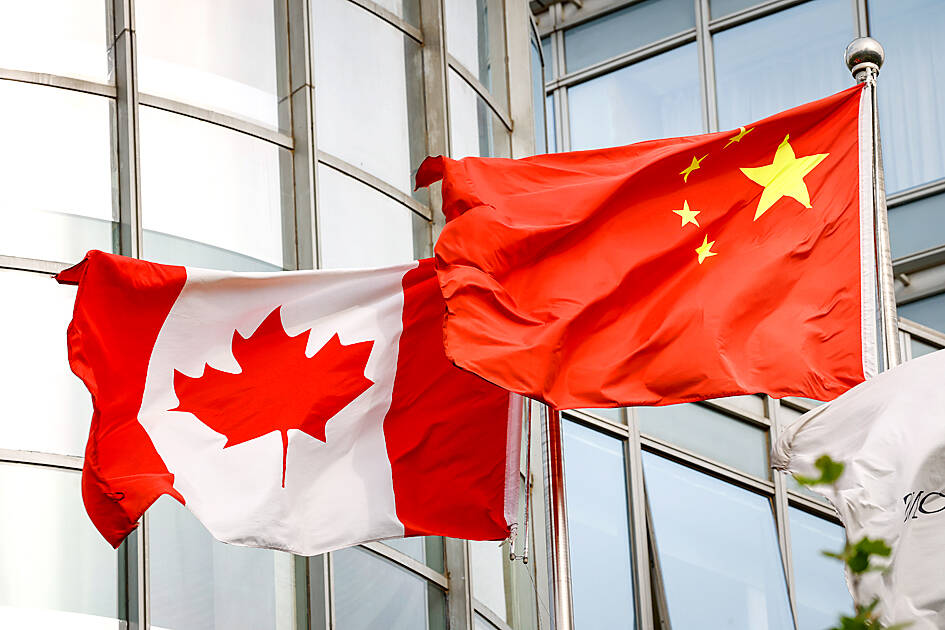China yesterday said that it would launch an anti-dumping probe into Canadian canola and chemical products, in apparent retaliation for Ottawa’s new restrictions on imports of Chinese electric vehicles (EVs).
Canadian Prime Minister Justin Trudeau last month announced tariffs of 100 percent on Chinese EVs, accusing Beijing of “not playing by the same rules as other countries” in areas such as environmental and labor standards.
The Chinese Ministry of Commerce said in an online statement that it “will initiate an anti-dumping investigation into canola imported from Canada, in accordance with the law.”

Photo: EPA-EFE
The ministry said domestic industries had recently reported that Canadian canola exports to China “have increased significantly,” reaching US$3.47 billion last year while prices “have continued to fall.”
Canadian exporters were “suspected of dumping” products into the Chinese market and that “China’s domestic canola-related industries have continued to incur losses under the influence of unfair competition by the Canadian side,” it said.
Beijing was “strongly dissatisfied and resolutely opposed” to the Canadian tariffs and planned to raise the issue with the WTO’s dispute resolution mechanism, it added.
China would also launch a similar probe into “relevant Canadian chemical products, based on applications by domestic industries,” the ministry said.
“China ... will take all necessary measures to defend the legitimate rights and interests of its enterprises,” it said.
Ottawa’s EV surtax, on top of existing import duties of 6.1 percent, is to be imposed from Oct. 1. A separate surtax on imports of steel and aluminum products from China is to take effect from Oct. 15.
Canada is among the world’s top producers of canola — an oilseed crop that is used to make cooking oil, animal feed and biodiesel fuel — and China has historically been one of its largest customers.
However, bilateral ties plunged into a deep freeze for several years from 2018, when Canada detained Huawei Technologies Co (華為) executive Meng Wanzhou (孟晚舟), while Beijing later arrested two Canadian nationals.
In 2019, Beijing banned imports from two Canadian canola providers — Richardson International Ltd and Viterra Inc — citing the detection of harmful organisms in the shipments.
Relations took a positive turn in September 2021, when Meng and the two Canadian nationals being held by China were all released after Meng reached a deal with US prosecutors.
In May 2022, China lifted its ban on canola imports from the Canadian firms.
Despite the relative detente, the two countries have in the past few years continued to have disagreements over a range of issues from trade and technology to human rights.

Intel Corp chief executive officer Lip-Bu Tan (陳立武) is expected to meet with Taiwanese suppliers next month in conjunction with the opening of the Computex Taipei trade show, supply chain sources said on Monday. The visit, the first for Tan to Taiwan since assuming his new post last month, would be aimed at enhancing Intel’s ties with suppliers in Taiwan as he attempts to help turn around the struggling US chipmaker, the sources said. Tan is to hold a banquet to celebrate Intel’s 40-year presence in Taiwan before Computex opens on May 20 and invite dozens of Taiwanese suppliers to exchange views

Application-specific integrated circuit designer Faraday Technology Corp (智原) yesterday said that although revenue this quarter would decline 30 percent from last quarter, it retained its full-year forecast of revenue growth of 100 percent. The company attributed the quarterly drop to a slowdown in customers’ production of chips using Faraday’s advanced packaging technology. The company is still confident about its revenue growth this year, given its strong “design-win” — or the projects it won to help customers design their chips, Faraday president Steve Wang (王國雍) told an online earnings conference. “The design-win this year is better than we expected. We believe we will win

Chizuko Kimura has become the first female sushi chef in the world to win a Michelin star, fulfilling a promise she made to her dying husband to continue his legacy. The 54-year-old Japanese chef regained the Michelin star her late husband, Shunei Kimura, won three years ago for their Sushi Shunei restaurant in Paris. For Shunei Kimura, the star was a dream come true. However, the joy was short-lived. He died from cancer just three months later in June 2022. He was 65. The following year, the restaurant in the heart of Montmartre lost its star rating. Chizuko Kimura insisted that the new star is still down

While China’s leaders use their economic and political might to fight US President Donald Trump’s trade war “to the end,” its army of social media soldiers are embarking on a more humorous campaign online. Trump’s tariff blitz has seen Washington and Beijing impose eye-watering duties on imports from the other, fanning a standoff between the economic superpowers that has sparked global recession fears and sent markets into a tailspin. Trump says his policy is a response to years of being “ripped off” by other countries and aims to bring manufacturing to the US, forcing companies to employ US workers. However, China’s online warriors